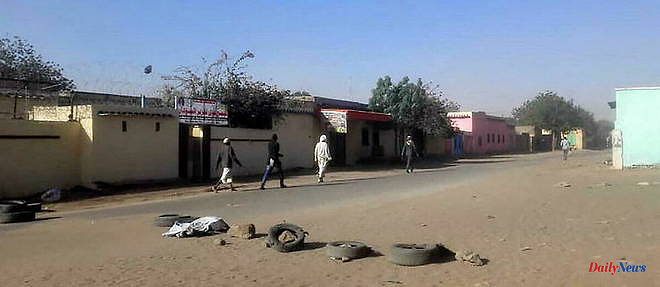In another life, Zeinab Abubaker was cultivating a plot of land in a peaceful village, not far from the Chadian border. In 2003, the janjaweed, militiamen armed by the government of Omar el-Béchir, destroyed this hamlet. The farmer flees to the capital of West Darfur, El-Geneina. Then, her house burned down during yet another wave of attacks in April 2022. With her six children, this Sudanese woman headed for the university, which had been converted, like many public buildings, into a "gathering point". Some 83,000 displaced people were concentrated there in mid-April "in abject sanitary conditions", deplores Mathilde Vu, advocacy officer at the Norwegian Refugee Council.
The camps that previously protected these civilians have indeed been regularly stormed since the return of the armed movements on the eve of the peace agreement signed in Juba in October 2020. In the meantime, El-Geneina has been ravaged by four massacres , causing more than a hundred deaths each time.
The clashes that began on April 15 in Khartoum, and other cities in Sudan, between regular troops of the Sudanese Armed Forces (SAF) of General Abdel Fattah al-Burhane and the powerful paramilitary militia of the Rapid Support Forces (RSF) led by General Mohamed Hamdan Dagalo alias "Hemeti" have reignited these latent tensions. It is impossible, for the time being, to obtain a human toll, especially since El-Geneina has been deprived of telecommunications since May 19. A union of doctors nevertheless claims that it has exceeded 500 victims since April 24, when janjawids supported by FSRs carried out the first raid on this city.
"I lost everything again," says ex-farmer Zeinab Abubaker, who fled to the premises of an NGO. The attackers stole the five goats that allowed him to survive. They also shot his niece and nephew who are waiting to be evacuated to Chad where 60,000 Sudanese have taken refuge in five weeks. "There are no more soldiers or police to protect us, because they went to fight in Khartoum," adds Gamer Abaker. Since the end of April, this teacher, also multi-displaced, has been sleeping on the street with his five children. The two survivors attribute these attacks to tribal motivations, far from the political stakes of the capital.
“We are witnessing a tribal conflict that has its roots from the beginning of the Darfur conflict, confirms a humanitarian source native to El-Geneina. At that time, Western Darfur was relatively spared from violence. But, on the eve of the Juba peace agreement, the young Massalit [a “non-Arab” people, editor's note] who had joined the rebel movements came back with their weapons. They settled with their family, who had remained all this time in the displacement camps. Memories of their slain loved ones sparked a thirst for revenge…”
For their part, the Arab militiamen have constantly called for the evacuation of these camps for fear of seeing them turn into rear bases. "The Juba peace agreement has changed the dynamics of this region, the most diverse in Sudan," said a Sudanese researcher specializing in militarization. Armed movements have returned without any concrete process to integrate them into the army or disarm them. The failure to establish a lasting peace has given rise to new conflicts. »
Since mid-April, the FAS have not managed to regain control of El-Geneina. "The army is reaping the fruits of its past mistakes," said Fathelrhman Abdelrhman, a professor specializing in conflict and peace at El-Geneina, who himself took refuge on the other side of the Chadian border. Because it was the leaders of the FAS and the political leaders of the old regime, all from central Sudan, who created the FSR to suppress the rebellion of non-Arab peoples against the historical marginalization of Darfur. It was at this time that Hemeti, who had been selling camels until then, acquired his first gold mines. He is now one of the richest men in the country.
Without water, electricity, network, or even a single functional hospital, El-Geneina experienced relative calm from May 15 to 24. “On the other hand, the Arab militias regrouped in the west of the city to prepare a new attack. While young people from Massalit communities are arming and organizing to launch a defensive counter-attack, "warns the humanitarian source on Wednesday afternoon.
During this period, residents of Nyala, the capital of South Darfur, and Zalingei, the capital of Central Darfur, witnessed an upsurge in violence. "My house was robbed and I was threatened with death," said a resident of Nyala who took the road to Juba. "The militiamen are occupying most of the residential neighborhoods in the east of the city, forcing residents to flee to the southern neighborhoods," said an activist from el-Fasher, the capital of North Darfur.
In the event of a defeat in the capital, Hemeti could retreat to his native Darfur. Rumors evoke his preference for El-Geneina. “The international airport in this city would allow him to receive help from outside. The nearest Chadian town is also only 35 minutes away by car,” explains the humanitarian. "I doubt that the truce declared on May 22 for seven days will extend to Darfur, which has always been isolated," he continues. This seems particularly complicated to me in El-Geneina, where the militiamen are fighting both against the army and against the Massalit. »
A few minutes after our exchange, this interlocutor in exile received videos of a new assault perpetrated by RSF reinforcements from Zalingei. This Wednesday, May 24, airstrikes also fell on Khartoum, violating, there too, the seventh attempt at a ceasefire.












